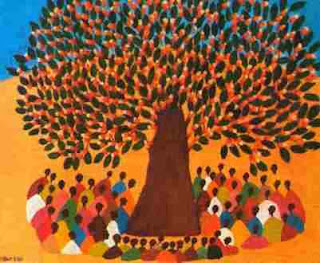PROPOSAL OF AN INFORMATION EDUCATION AND COMMUNICATION INITIATIVE
ON BEHALF OF MIGRANTS IN ITALY (AND EUROPE)
I should like to address just an aspect of the overall
complex scenario of international migrations, that is, the question of the
social, cultural, emotional and political integration of the refugees, asylum seekers and so-called
economic migrants in the Italian context.
We all know that, given the current international
conflicts and crises, the impact of epochal climate changes already
deteriorating fragile agricultural economies, given high rates of unemployment
and lack of opportunities in “developing” countries, inflows of migrants will
continue and increase in the future, all over the world, over Europe and in
particular in Italy, owing to its geographical coordinates. It is not necessary here to mention numbers,
but we are speaking of hundreds of thousands of human beings arriving every
year, people who risk their lives and go through incredibly hard vicissitudes
and are obliged to pay absurdly high sums to the organized international crime.
Too often, they pay with their lives their daring to hope for a better life. The
worsening climate conditions all over the planet, in particular impacting
already the poorer rural areas of Africa, Asia and South America, will produce
many more climate refugees in the near future.
However, the majority of the Italian people, and in
particular those more prone to lend ears to populist and xenophobic discourse,
have very vague ideas about the living conditions of those who are “forcibly
displaced”, apart from the TV images of Iraqi, Afghan or Syrian civil
wars, or some documentary on some African country. They travel to spend
vacations in Kenya, South Africa, Morocco or Tunisia with organized tour
operators, barely speak one foreign language, rarely two. This
explains at least partially the success of some Italian parties like the League
or Brothers of Italy and conflictual outbreaks and clashes as those in Rosarno
a few years ago. Others live in small urban areas, already deprived of decent
services and amenities and fear that the accommodation of a few foreigners will
worsen already precarious living conditions. But there are also well-off
families who refuse hospitality.
These are people hardly reading national newspapers,
let alone international newspapers; their world vision stops very near the
threshold of their own apartment or semi-detached houses. It is not only an
Italian phenomenon, though, the rise of these nationalistic and ultimately
selfish attitudes. We are witnessing a rising trend in many European countries
towards more restrictive policies towards hosting increasing refugees and
migrant inflows: even generous Germany is backtracking, and we see how the
“Front National” in France is gaining ground. Poland and Hungary are ruled by
rightist xenophobic leaders. We need to counter this surge of intolerance and
mistrust towards strangers that threatens to pervade Europe.
As far as Italy is concerned, it is therefore to be
welcomed the news that our Ministry of the Interior is launching a Plan for a
better distribution all over Italy of migrants and refugees, with quotas for
Municipalities, according to their population, on a voluntary basis. The
key-phrase is “on a voluntary basis”. Mayors are very sensitive to prevailing
moods in the towns they manage and represent, as they want to keep their
popularity, and in order to favour acceptance by a wider audience of such a
move towards hosting strangers it is necessary that a new awareness of a wider
world outside their windows be aroused.
Who among them has ever heard of conditions prevailing
in Maiduguri, Diffa, Juba or the Gambia? Who has an idea of what is still going
on in Darfur, of the shambles of 28 September 2009 in Conakry? Of the current
crisis in R.D.C., In Kashmir, In Burundi or what is life like in Peshawar?
That is why I think that, in parallel with the
above-mentioned plan of distribution of refugees and migrants, another
initiative is necessary in order to increase the chances of success of the
acceptance and integration of the strangers into the local context. Information,
Education and Communication (I.E.C.) campaigns have proved effective in the last
decades with good results, and have mainly fulfilled expectations. We can also
remember the IEC campaigns on behalf of people living with AIDS, or of the
Social Marketing initiatives on breastfeeding, or the prevention of STD’s and
AIDS in African countries and in South East Asia. IEC campaigns are designed on
top of K.B.A.P. (knowledge, beliefs, attitudes and practices) surveys, we may
add also stereotypes and prejudice. In
Italy, we can surely gather a sufficient know-how in order to launch an
articulated and effective campaign involving, in the forefront, the main
interested party, the refugees and migrants themselves, in the short-medium
term. Beyond moderately using mass media, the IEC campaign should concentrate
on a panoply of multiple educational tools and involve a grassroots approach
and vis-à-vis communication. Expertise in the international field is certainly
available, and I am sure there will be many adult education and international
cooperation consultants who will be very happy to volunteer for free to design,
organize and participate in such an exciting and useful undertaking.
It would do a world of good to our country and Italy may become an example to follow in Europe.
Update 9 November 2016: The number of people drowned during the dangerous crossing of the Mediterrenean had reached the appaling figure of 4,233 on 7 November.(https://missingmigrants.iom.int/mediterranean). Please note that many more may have died onroute on land from their countries towards the coast of the Mediterranean, or in Lybian prisons, or in unknown shipwrecks.
Update 9 November 2016: The number of people drowned during the dangerous crossing of the Mediterrenean had reached the appaling figure of 4,233 on 7 November.(https://missingmigrants.iom.int/mediterranean). Please note that many more may have died onroute on land from their countries towards the coast of the Mediterranean, or in Lybian prisons, or in unknown shipwrecks.







